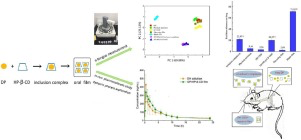The aim of this study was to develop a palatable donepezil (DP) orodispersible film (ODF) to facilitate the swallowing process and investigate the effect of cyclodextrin on taste-masking based on
dynamic process and in
vivo drug absorption. Complexation of DP with hydroxypropyl-β-cyclodextrin (HP-β-CD) was applied to mask the bitter taste then the prepared complexes were incorporated into ODF using
solvent casting method. The taste-masking efficiency was evaluated by e-tongue; meanwhile the pharmacokinetic behavior of DP/HP-β-CD ODF was investigated by in
vivostudy. Results showed the optimized film was more palatable than donepezil hydrochloride (DH) film and was bioequivalent with DH. The molecular mechanism was revealed by phase solubility
study, Fourier-transform infrared spectrometer (FT-IR), Differential scanning calorimeter (DSC), X-ray diffraction (XRD) and molecular modeling. Taste-masking was attributed to the formation of
DP/HP-β-CD which was due to moderate interaction between DP and HP-β-CD. The stability of DP/HP-β-CD was decreased because of the acid environment in stomach, which facilitated the absorption of DP.
These results extended our understanding about the application of cyclodextrin complexation and provided guidance for the design of ODF especially for drugs with disgusting taste.
- Home
- Blog
- News
- Basics
- Sources
- Agencies, Regulatory & Organisations
- CERSI Excipients Browser
- Excipient Report
- Excipient DMF List
- EXCiPACT Certified Companies
- Excipient Documentation
- Excipient EINECS Numbers
- Excipient E-Numbers
- FDA Inactive Ingredient List
- FDA GRAS Substances (SCOGS) Database
- IPEC Americas
- USP - U.S. Pharmacopeia
- Definitions
- Whitepapers / Publications
- Supplier
- Services
- Media
- Events
- 1st pharmaexcipients Poster Award
- Event Calendar
- Events featured by pharma-excipients
- 4th Annual Formulation & Drug Delivery Congress
- DDF Summit
- ExcipientFest Americas
- ExcipientFest Asia
- Global CompliancePanel
- International Conference and Exhibition on Pharmaceutics & Novel Drug Delivery Systems
- Formulation & Drug Delivery USA Congress
- Laboratory Medicine 2018
- Making Pharmaceuticals Europe
- Making Pharmaceuticals Exhibition
- Pharma Integrates
- PharmaExcipients China @CPhI China
- TTC Technology Training Center
- Jobs
- Online Sourcing
- Contact

